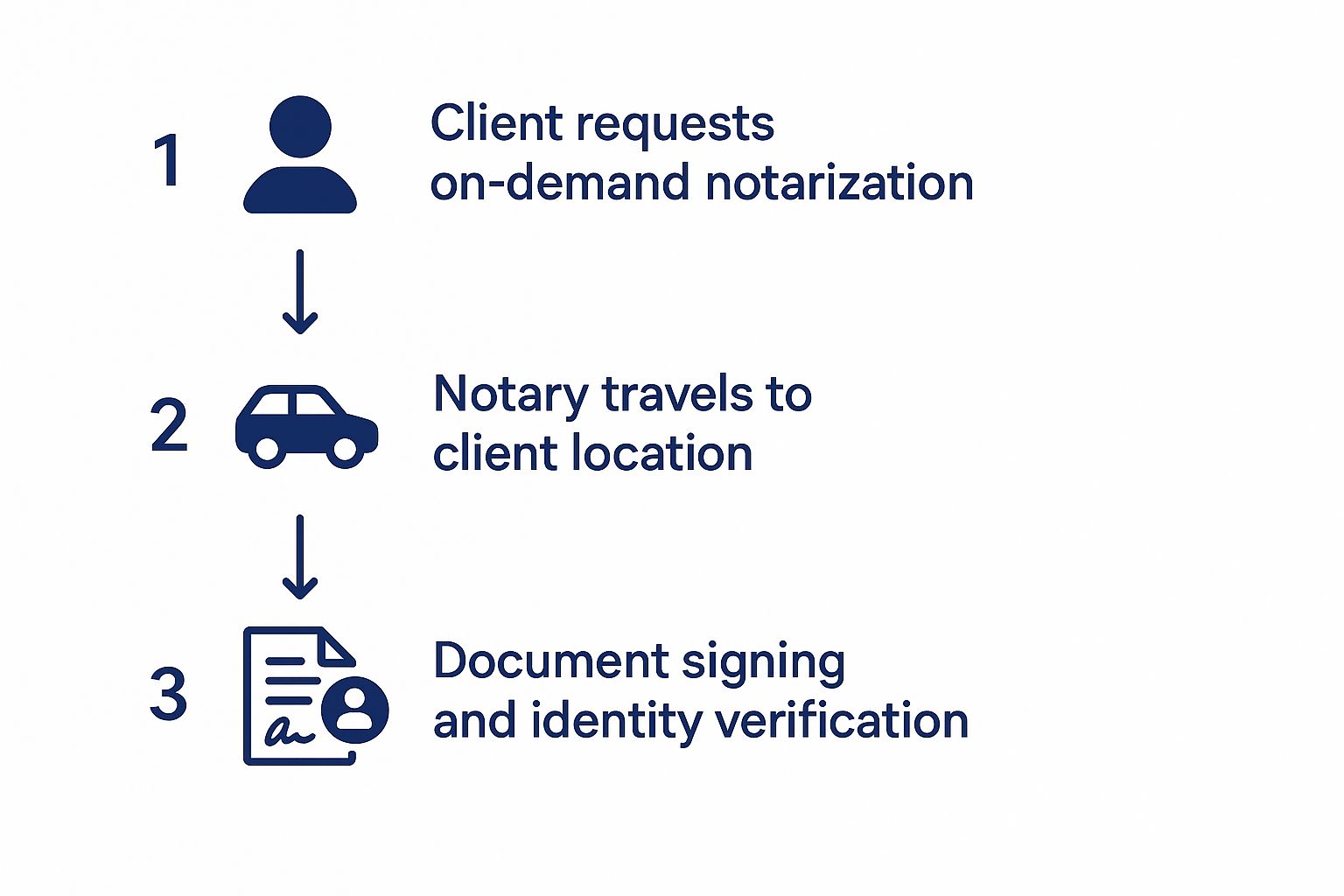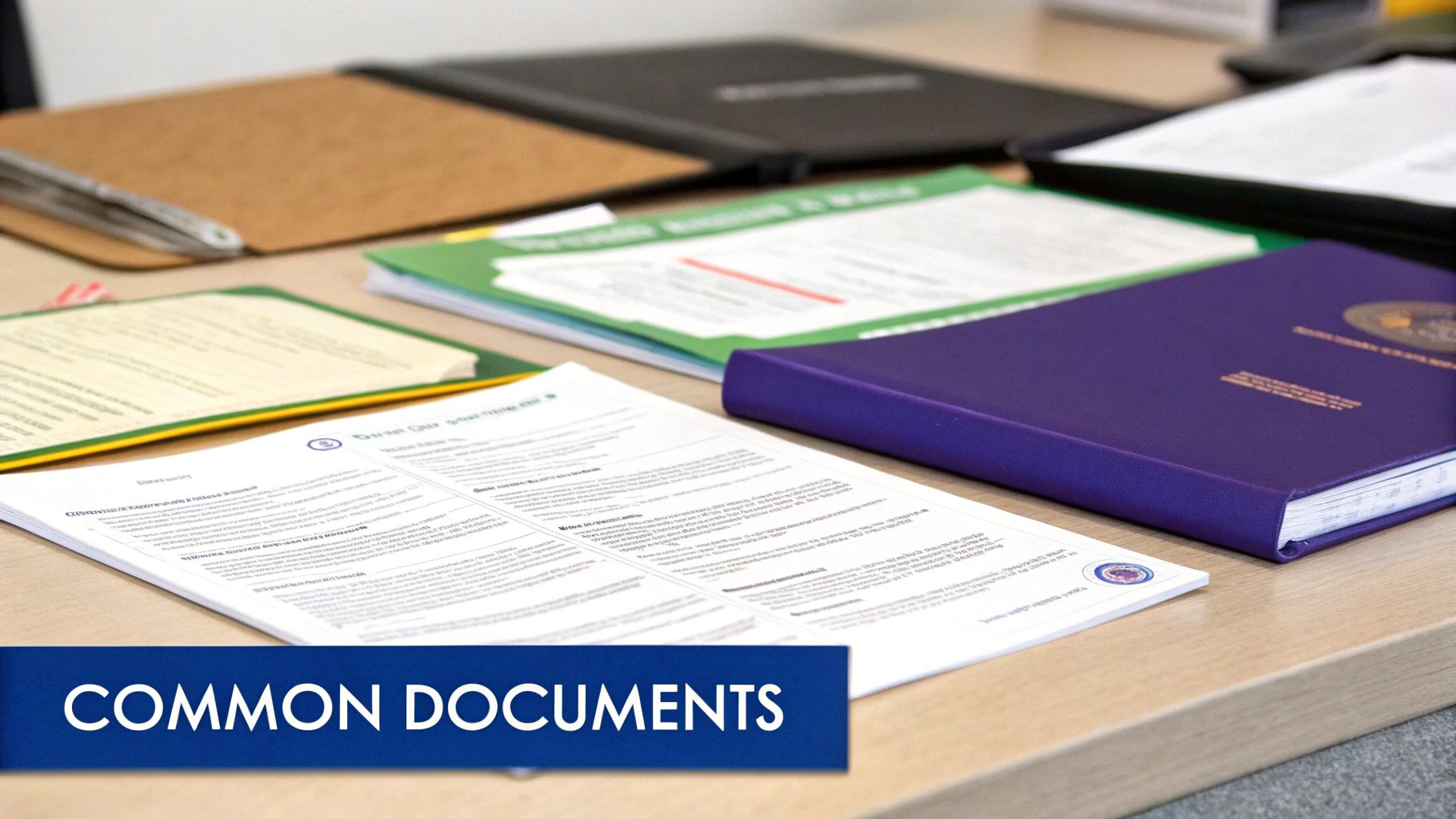Mobile Notary Services The Ultimate Convenience Guide
- WebsiteFix Technical Partner
- Jul 16, 2025
- 15 min read
Picture this: you need a document notarized, but instead of the usual scramble to find a bank or a shipping store during their limited business hours, the notary comes to you. That's the essence of a mobile notary service. It's like a house call for your most important paperwork.
A mobile notary is a fully commissioned Notary Public who travels to your location—wherever that may be—to handle the notarization process. This simple shift in venue saves you a ton of time and completely sidesteps the usual logistical headaches.
What Exactly Is a Mobile Notary Service?
Think of a mobile notary as an on-demand professional who brings the official, state-sanctioned services of a notary public right to your doorstep. Instead of you working around someone else's schedule, they work around yours.
This means a traveling notary can meet you at your home, your office, a hospital, a local coffee shop—pretty much anywhere that's convenient for you. Their job is to verify your identity, witness your signature, and apply their official seal. The legal weight of the notarization is exactly the same as if you'd gone to a brick-and-mortar office. The only thing that changes is the location.
The Core Function of a Notary
Whether they’re in a fixed office or on the move, a Notary Public’s role is always the same: to serve as an impartial witness and prevent fraud. This involves a few critical steps:
Verifying Identity: The notary's first job is to confirm everyone's identity using a valid, government-issued photo ID.
Ensuring Willingness: They need to make sure you're signing the document willingly, without any pressure or coercion.
Confirming Awareness: The notary also checks that you understand what you're signing and are aware of its significance.
This tried-and-true process gives legal integrity to critical documents like real estate deeds, powers of attorney, and affidavits. A mobile notary service simply delivers this essential function in a much more accessible way.
A mobile notary isn't offering a different type of notarization; they're offering a different method of delivery. The convenience is in their mobility, bringing a necessary legal formality right where you need it, without ever compromising on security or compliance.
Traditional Notary vs Mobile Notary at a Glance
So, what's the real difference? It all boils down to how you access the service. While both traditional and mobile notaries provide the same legally binding notarization, the experience is worlds apart.
The table below breaks it down clearly.
Feature | Traditional Notary | Mobile Notary Service |
|---|---|---|
Location | Fixed office (bank, law firm, etc.) | Your chosen location |
Scheduling | Limited to standard business hours | Flexible, including evenings & weekends |
Convenience | Requires you to travel to them | They travel to you |
Accessibility | Difficult for those with mobility issues | Ideal for hospital-bound or home-bound clients |
Speed | Can involve waiting in line | Often same-day or on-demand service |
Ultimately, choosing a mobile service is about prioritizing your own time and convenience. It's a modern solution designed for busy schedules, urgent needs, and situations where getting out of the house just isn't an option.
Why Mobile Notarization Is More Popular Than Ever

While the idea of a notary coming to you has been around for a while, its recent surge in popularity is a game-changer. What was once a niche offering is now a thriving industry, reshaping how we handle important documents. This isn't just a random trend; it’s a direct response to our fast-paced, modern lifestyles.
Think about it. We expect nearly everything to be convenient and on our schedule, from getting dinner delivered to meeting with a consultant online. Mobile notary services tap directly into this mindset, transforming a traditionally stiff, office-bound task into a flexible service that works for you.
The Remote Work Boom Lit the Fuse
A huge catalyst for this change has been the massive shift to remote and hybrid work. The days of getting everyone into a conference room to sign papers are quickly fading, especially when your team is scattered across different cities, states, or even countries.
This new, decentralized way of working created an urgent need for adaptable solutions. Imagine needing a key employee to sign a critical contract. Instead of making them hunt for a local notary office, a mobile notary can show up right at their doorstep. The document gets notarized quickly and professionally, all without missing a beat.
Keeping Pace with High-Stakes Industries
Certain industries have always run on tight schedules, and they were among the first to fully embrace mobile notaries. Real estate and law are two perfect examples.
A real estate closing is a whirlwind of paperwork. Buyers, sellers, and agents all need to sign, and getting everyone in the same room at the same time can feel like herding cats. A mobile notary cuts through the chaos by traveling to each person, collecting signatures, and keeping the entire closing process moving forward. In today's competitive market, that kind of speed isn't a luxury—it's a necessity.
Likewise, legal and financial pros lean heavily on these services for time-sensitive situations, such as:
Powers of Attorney: When a client is in the hospital or has mobility challenges.
Estate Plans: Helping elderly clients finalize their wills and trusts from the comfort and privacy of their homes.
Business Agreements: Seizing a sudden opportunity by finalizing a contract after hours or on a weekend.
If you want to learn more about the specific documents that need this formal verification, check out our guide on why you might need a notary. It breaks down the crucial role notaries play in making your agreements official.
The rise of the mobile notary mirrors our societal shift towards convenience and efficiency. It’s about removing friction from essential processes, making legal formalities as accessible as any other modern service.
The Numbers Tell the Story
This isn't just a feeling; the market data shows just how big this shift is. The global mobile notary market was recently valued at around USD 3.5 billion, a figure that proves this is a widespread, mainstream solution.
And it’s not slowing down. Projections estimate the market will more than double to USD 7.2 billion by 2033. This incredible growth is powered by ongoing urbanization, the persistence of remote work, and laws that are catching up to recognize notarizations performed outside a traditional office setting.
Ultimately, the boom in mobile notarization is a story of adaptation. Our lives are more dynamic and less tied to a single location than ever before. The services we rely on have to evolve, too. Mobile notaries provide that vital link between the timeless need for legal security and the modern demand for convenience.
What to Expect During Your Mobile Notary Appointment
Knowing how a mobile notary appointment works can take all the guesswork and stress out of the equation. The entire experience is built around your convenience, designed to be simple and professional from start to finish.
Let's walk through the process together. By the end, you'll know exactly what happens from the moment you book the service to when the notary applies their official stamp.
Finding and Scheduling Your Notary
The first step is the easiest: just get in touch. You can find and schedule a mobile notary by calling a provider like Signature on Demand or by booking through our website. During that first call or online booking, we'll just need a few key pieces of information to get you set up:
Your Location: Where should we meet you? This can be your home, office, a coffee shop, a hospital room—practically anywhere.
The Type of Document: Give us a heads-up on what you need notarized, whether it's a power of attorney, a real estate deed, or an affidavit.
The Number of Signers: Let us know how many people need to sign the document in front of the notary.
A Convenient Time: We'll work around your schedule. We can arrange for an appointment during the day, in the evening, or even on a weekend.
Once we've got those details locked in, your appointment is officially on the books. The notary will have everything they need to head your way fully prepared.
Preparing Your Documents and ID
A little bit of prep work on your end before the notary shows up makes a world of difference and ensures everything goes off without a hitch. You really only need to focus on two things: the document itself and your ID.
First, and this is the big one, do not sign the document beforehand. A huge part of a notary's job is to personally witness you signing it. If you sign it early, the notary can't legally proceed and will have to turn down the job. Make sure every other field on the document is filled out completely, but leave those signature and date lines empty.
The golden rule of notarization is to wait for the notary. Signing your document before they arrive is the single most common mistake we see, and it can derail the whole appointment. A little patience ensures the process is legally sound and efficient.
Next, you'll need a valid form of identification. This is an absolute must, as the notary's main responsibility is to confirm you are who you say you are. A valid ID is always government-issued and includes a photograph. The most common forms are:
A current Driver’s License
A state-issued ID card
A U.S. Passport or Passport Card
A U.S. Military ID
Just double-check that your ID isn't expired and that the name on it is an exact match for the name printed on your document.
This infographic gives you a quick visual of how our on-demand mobile notary services work.

The In-Person Meeting and Notarization
When the notary arrives, they'll introduce themselves and get the ball rolling. They'll start by asking to see your ID to officially verify who you are. At the same time, they'll give the document a quick once-over to make sure it’s complete and to understand what type of notarial act is needed.
With your identity confirmed, you’ll sign the document right there in front of them. The notary then finishes the job by completing the notarial certificate, adding their own signature, and applying their official seal or stamp. And that’s it—your document is officially notarized! Our guide on how mobile notaries make document signing easier dives even deeper into this incredibly helpful process.
When a Mobile Notary Becomes Essential

Sure, mobile notary services are convenient, but sometimes they're much more than a simple time-saver. In certain situations—driven by logistical hurdles, medical issues, or urgent deadlines—they become absolutely essential. These are the moments when getting to a traditional notary office just isn't in the cards.
Think of a mobile notary as a critical access provider. They bridge the gap between what the law requires and the reality of people's lives, ensuring vital transactions don't grind to a halt just because someone can't travel. They solve real-world problems for people in diverse and often difficult circumstances.
Assisting Clients with Limited Mobility
One of the most impactful roles a mobile notary plays is serving individuals who are homebound, hospitalized, or living in assisted care facilities. For them, a trip to an office isn't just an inconvenience; it's a major obstacle.
Imagine an elderly parent who needs to finalize their will or trust. The stress and physical strain of arranging transportation and navigating an unfamiliar building can be overwhelming. A mobile notary eliminates that entire ordeal by coming directly to their home, creating a calm, comfortable space for a deeply personal process.
Or consider a patient in a hospital who must sign a power of attorney so a loved one can manage their affairs. Time is often critical, and the patient's condition makes leaving the hospital impossible. A mobile notary can visit the room, verify identity, and see that the document is properly executed, offering tremendous peace of mind during a tough time.
Navigating Complex Real Estate Closings
Real estate deals are famous for their mountains of paperwork and unforgiving timelines. A closing often involves a whole cast of characters—buyers, sellers, agents, lenders—who all need to sign on the dotted line. Trying to get everyone in the same title company office at the same time can be a logistical nightmare, especially if someone is out of state.
This is where a mobile signing agent, a notary specializing in loan documents, truly shines. They can:
Travel to the seller's office in the morning for their signatures.
Meet the buyers at their home in the evening after work.
Ensure every page is signed, dated, and notarized correctly, heading off delays that could derail the entire deal.
By traveling to each party, a mobile notary acts as the logistical glue holding the transaction together. They transform a process that could take days of coordination into a seamless, efficient workflow, ensuring deadlines are met and closings happen on time.
Urgent Business and Legal Needs
The world of business doesn't neatly fit between 9 AM and 5 PM. A critical contract might need a signature late at night to close a deal, or a legal affidavit may require immediate notarization for a court filing the next morning. In these cases, waiting for standard business hours is not an option.
Mobile notaries provide the flexibility to handle these urgent, after-hours needs. They can meet you at your office, an airport, or wherever you are to get time-sensitive documents executed without delay. This on-demand service is a crucial advantage when opportunities or legal deadlines are on the line.
This on-site service is also invaluable for individuals in correctional facilities who need to sign legal documents like property deeds or custody agreements. It's equally vital when someone is navigating a major life change, such as the loss of a spouse and the need to update property records. For more on this, our guide on navigating property deed changes after a loss can be a helpful resource.
When you start looking for easier ways to get documents notarized, you’ll quickly run into two terms: mobile notary services and Remote Online Notarization, or RON. It’s easy to get them mixed up, but they’re fundamentally different ways of getting the job done.
Think of it like this: a mobile notary is basically a notarization "house call." A certified professional travels to meet you in person, wherever you are. On the other hand, RON is more like a secure "video conference" for your documents, where everything happens online.
Physical Presence vs. Digital Connection
The real difference comes down to one thing: physical presence.
With a mobile notary, you and the notary have to be in the same room. They’ll check your government-issued ID, watch you physically sign the paper document with a pen, and then apply their traditional ink stamp or embosser. It’s the classic notarization process, just without the trip to an office.
Remote Online Notarization (RON) completely removes the need to meet face-to-face. You, the notary, and your documents all connect through a secure, state-approved audio-visual platform. You’ll hold your ID up to the camera, and the system will often ask you a few questions only you would know to confirm it's really you. After that, you'll electronically sign a digital document, and the notary applies their digital seal.
This shift toward digital options is part of a much bigger trend. The market for these convenient notary models has been growing rapidly, jumping from USD 348.2 million in 2023 to a projected USD 1,885.5 million by 2031. North America is leading the charge, largely because new laws are making these services more accessible than ever. You can dive deeper into this growth with recent market analyses on reportsnmarkets.com.
The Key Takeaway: Mobile notarization is an in-person service that comes to you. Remote Online Notarization is a completely virtual service you can do from anywhere with an internet connection.
Comparing Your Options Side-by-Side
So, which one is better? It really depends on your document, your comfort level with technology, and what the law requires for your specific situation. This table breaks it down to help you see the differences at a glance.
Feature | Mobile Notary Service | Remote Online Notarization (RON) |
|---|---|---|
Location | In-person meeting at a location of your choosing. | Fully remote meeting via secure audiovisual technology. |
Documents | Physical paper documents are signed with wet ink. | Digital documents (like PDFs) are signed electronically. |
ID Verification | Notary physically inspects your government-issued ID. | Digital ID analysis and knowledge-based authentication. |
Technology Needed | No special technology is required for the signer. | A computer or smartphone with a camera, microphone, and internet. |
Best For | Clients who prefer a face-to-face interaction or have paper documents. | Tech-savvy clients, signers in different states, or urgent digital needs. |
Which Service Is Right for You?
Ultimately, the choice comes down to what works best for your circumstances.
Go with a Mobile Notary if: You prefer the familiarity of a traditional, in-person signing. It's also the perfect solution if your documents are already printed out on paper or if you’re just not a fan of navigating new digital platforms. It’s modern convenience with a classic touch.
Opt for Remote Online Notarization (RON) if: You're comfortable with technology and need speed and flexibility. RON is a game-changer when signers are in different cities (or even countries), or when you need a document notarized and sent off digitally within minutes.
In the end, both mobile notary services and RON were created to make your life easier. They break down the old barriers of travel and rigid office hours, putting you in control of how and where your important documents get finalized.
Ensuring a Secure and Legal Notarization

When you're dealing with important documents, trust is non-negotiable. It's natural to wonder if the convenience of a mobile notary service means sacrificing security or legal standing. The short answer is no—that convenience is built on a solid foundation of safeguards designed to protect you and the integrity of your transaction.
Every professional mobile notary isn't just a traveling agent; they are a state-commissioned official. They've had to meet strict state requirements to act as an impartial witness, confirming every signature is both genuine and made without coercion. This commission is the very source of their authority.
Verifying a Notary’s Credentials
Before a notary ever arrives at your door, you should feel completely confident in their legitimacy. A true professional operates with total transparency and will have no problem verifying their status.
Here are the key credentials every professional mobile notary should have:
State Commission: Think of this as their official license, issued by the Secretary of State's office. You can usually look up a notary's commission on your state's official website to confirm they are active and in good standing.
Bonded: Most states require notaries to be bonded. This is a type of surety bond that protects the public from financial harm if the notary makes a mistake or engages in misconduct.
Insured: While not always a state requirement, a dedicated professional will also carry Errors & Omissions (E&O) insurance. It’s an extra layer of financial protection for everyone involved.
Never hesitate to ask for proof of these credentials. It's a perfectly reasonable request, and any legitimate notary will be happy to provide it.
The Notarization Security Checklist
During the actual appointment, the notary follows a strict, legally required protocol. This isn't just about watching you sign your name; it’s a methodical process designed to prevent fraud and ensure everything is above board.
A notary’s primary duty is to act as a gatekeeper against fraud. Their journal, stamp, and signature are not just formalities—they are an official record that a transaction was verified, willing, and properly executed according to law.
The notary will take several non-negotiable steps to secure the notarization:
Thorough Identity Verification: They will carefully examine your government-issued photo ID. They're trained to check the photo, signature, and physical details to confirm you are exactly who you say you are.
Confirming Awareness and Willingness: The notary is required to make sure you understand the document you're signing. They also need to confirm that no one is forcing or pressuring you to sign it.
Maintaining a Secure Journal: Every single notarization is meticulously recorded in a journal. This logbook contains the date, time, type of notarial act, document details, and your signature, creating a permanent, traceable record of the event.
The real appeal of mobile notaries is how they cut through red tape, save you time, and offer services well beyond typical 9-to-5 business hours. This flexibility is a game-changer, making mobile notary services a key component of modern business and personal life. To get a broader sense of their role, you can explore the latest mobile notary market insights on businessresearchinsights.com.
Answering Your Mobile Notary Questions
It's completely normal to have a few practical questions pop up before you book a mobile notary. Let's walk through some of the most common ones we hear, so you can feel totally confident and prepared for your appointment.
How Much Does a Mobile Notary Cost?
Think of the total cost in two simple parts. First, you have the standard fee for each signature being notarized. This fee is often set by state law to ensure it's fair and consistent. The second part is a travel fee, which covers the notary's time and expense for coming directly to you.
Several things can influence the travel fee, including:
How far the notary needs to travel to reach you.
The time of day—appointments after regular business hours or on weekends might have a higher fee.
The type of location, as places like hospitals or jails can require more time and effort to access.
A reputable service will always give you a full, transparent quote upfront. Don't hesitate to ask for a clear breakdown of the costs so you know exactly what to expect.
What Kind of ID Do I Need to Bring?
This is a big one. You absolutely must have a valid, government-issued photo ID. This is how the notary officially verifies who you are, and there are no shortcuts around it.
A notary is legally required to see proper identification. The name on your ID must match the name on the document you're signing perfectly.
Generally, you'll need one of the following:
State-issued driver's license
State-issued photo ID card
U.S. passport or passport card
U.S. military ID
Just be sure your ID is not expired, or at least not expired beyond what your state's laws permit for notarizations.
Can a Notary Actually Refuse to Notarize My Document?
Yes, they can, and it's a critical part of their job. A notary has a legal duty to refuse the service if something isn't right. This could be because they can't confirm the signer's identity, the person seems confused or unaware of what they're signing, or it appears they are being forced to sign.
They'll also have to say no if the document has blank spaces or is incomplete. This authority is what keeps the whole process trustworthy and is a key safeguard against fraud.
When you need a professional you can count on, Signature on Demand makes it simple. Whether you need an on-the-go notary, a remote online session, or help preparing your documents, we bring our expertise right to your doorstep.




Comments